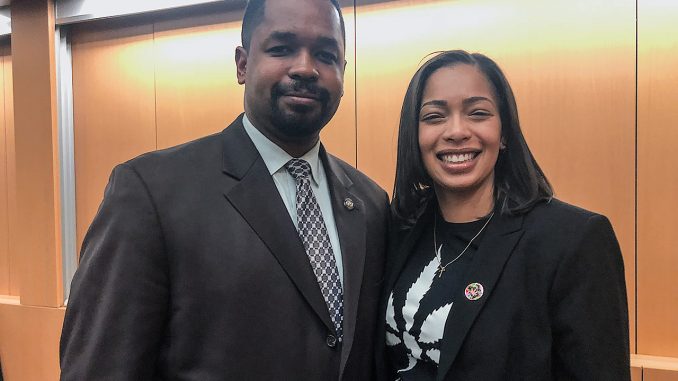
Desiree Ivey and Cherron Perry-Thomas, the founders of the Diasporic Alliance for Cannabis Opportunities, traveled around the country to attend cannabis industry conferences. They quickly realized they were the some of the only people of color in attendance.
“When we would look around a conference of 20,000 people, we would represent 1 percent,” Ivey said. “Enough is enough. Our people clearly can’t fly and afford a $799 ticket. That’s their way of keeping us out. They don’t want us in this billion-dollar industry.”
Eighty-one percent of marijuana business owners and founders surveyed across the country were white, in a 2017 report compiled by Marijuana Business Daily, a cannabis industry news publication. Only 4.3 percent of business owners surveyed were Black.
Ivey and Perry-Thomas created DACO to bring cannabis business education directly to minority groups. Ivey also works at a for-profit organization that helps women in the cannabis industry. Perry-Thomas is the founder of Green Dandelion Marketing, a group that helps organic brands develop their businesses.
DACO aims to reduce the stigma of cannabis, bring awareness to careers in the industry and create more educational resources for marginalized communities.
The alliance’s clinic also offers medical marijuana cards for only $50, making the treatment option more affordable, said Micah Mahjoubian, the policy director for state Sen. Sharif Street, who represents the area near Main Campus.
DACO hosted its first Cannabis Opportunities Conference, which was sponsored by Street and held in the Medicine Education and Research Building on the Health Sciences Campus. The alliance offered free workshops and exhibits open to the public on Oct. 19 and 20 about cannabis-based businesses.
DACO reached out to Street because of his push for pro-cannabis legislation. He said the alliance opens the dialogue for empowering marginalized groups in the cannabis industry.
Current laws impacting the industry make it difficult for the average person to start their own business from the bottom up, Ivey said.
Because marijuana remains a Schedule I substance under the Drug Enforcement Administration’s classification, there are many regulations and expenses, like licenses and start-up fees, which some people in underserved minority communities cannot afford.
Porter Gardiner, a Thai bodyworker who practices yoga and acupressure, attended the conference. She uses cannabis-infused oils and salves for her clients’ different conditions. Her son was diagnosed with multiple sclerosis two years ago and treats his pain and flares with cannabis products.
“Because of that, it’s more than just people smoking it just to relax for a day,” Gardiner said. “We need this because we have legitimate ailments that we need within our own system that can help us.”
For those like Gardiner and Ivey, who has lupus and also treats flares with cannabis, reforming marijuana laws will make treatment for illnesses more attainable, as well as make the industry less costly.
Mahjoubian said the Decriminalization of Cannabis in Pennsylvania bill would legalize and tax marijuana purchases and businesses. The bill was put forward by Street and is currently sitting in the state senate.
“The more reform that we get, the more folks that will have these opportunities,” Mahjoubian said.
By doing this on the federal level, Mahjoubian said, banks would be able to get involved and create loans for startups. Medical marijuana research, which Temple is currently conducting, would be able to have a stronger foothold in Philadelphia.
The cannabis industry is not only about growing and distributing marijuana, but also includes hemp products to make jewelry, clothes and medicinal oils.
Rashida Watson, the owner of the Silk Tent, a store in the Powelton neighborhood where she designs and makes her own jewelry, said DACO’s agenda can also benefit businesses on a local level.
“This is for the community and…the average person [to] have access to all this information, and to benefit the same way that large companies do,” she said.
Desmond McKinson, Street’s communications director, said that it is imperative that events like DACO become routine. He said that as the cannabis industry emerges, Street’s team recognizes the importance of being inclusive to all groups of people.
“This event will help educate, destigmatize and empower some of these communities,” McKinson said.


Be the first to comment